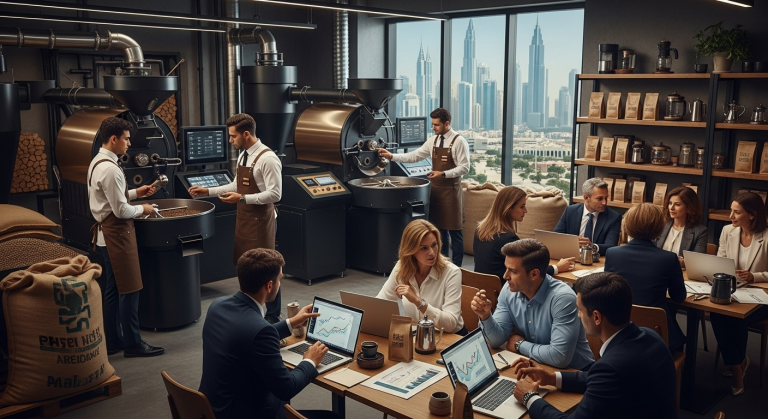Market Analysis and Opportunities
Dubai has rapidly become the focal point for specialty coffee enthusiasts in the Middle East, driven by the city’s cosmopolitan demographics, robust consumer spending, and booming hospitality sector. According to the UAE Coffee Market Report 2023, the specialty coffee segment is expected to grow at a CAGR of 8-10% from 2023 to 2028, outpacing traditional coffee consumption due to rising demand for premium experiences. The Dubai market is characterized by sophisticated consumers eager for artisanal blends, single-origin beans, and ethically sourced products — a significant opportunity for specialty coffee roasting businesses.
Target Market Analysis
– The core clientele includes young professionals, tourists, expats, and the growing number of remote workers and entrepreneurs frequenting Dubai’s numerous co-working spaces and cafes.
– The UAE boasts one of the world’s highest per capita incomes, and consumer behavior reflects a growing openness to premium pricing for distinguished quality and unique flavor profiles.
– Demand for traceability, sustainability, and experiential brands is influencing purchase decisions, while online channels and app-based ordering are driving digital transformation in the industry.
Industry Trends
– Increased interest in sustainability, with consumers gravitating toward eco-friendly brands and fair-trade certified products.
– Expansion of digital platforms and delivery services, with advanced online ordering, subscription boxes, and virtual tasting experiences.
– Health-conscious consumption patterns, including sugar-free, vegan, and organic options.
Marketing Needs & Strategies
– Data-driven market research is crucial for tailoring products and promotions to Dubai’s diverse audience.
– Targeted digital campaigns via SEO, PPC, social media, and influencer partnerships will maximize reach.
– Local branding strategies and robust storytelling are necessary to differentiate amid high competition and to resonate with UAE values of quality, luxury, and innovation.
Expansion Potential
– Opportunity for market entry in other Emirates and the broader GCC, leveraging logistics hubs and Dubai’s position as a re-export center.
– Scaling B2B offerings to hotels, restaurants, and offices, and exploring export markets in Africa, Europe, and Asia, driven by Dubai’s global connectivity.
Comprehensive Business Overview
A specialty coffee roasting business in Dubai involves sourcing premium green coffee beans, roasting them locally, and distributing to retail (B2C) or commercial (B2B) customers. The business may serve cafes, restaurants, hotels, and direct consumers through flagship stores, e-commerce platforms, or third-party retailers.
Mission: To elevate coffee culture in the UAE by delivering ethically sourced, expertly roasted beans with a focus on quality, traceability, and customer experience.
Vision: Becoming a regional leader in specialty coffee roasting, recognized for innovation, sustainability, and community engagement.
Core Objectives:
- Establish a world-class roasting facility serving Dubai and, eventually, the wider GCC
- Build a strong experiential brand with a loyal community of coffee aficionados
- Leverage technology to streamline operations and provide superior customer service
The ideal stage for market entry in 2024 is startup or early growth, either within a Dubai Free Zone (for full foreign ownership and simplified setup) or on the Mainland when targeting local B2B distribution.
Competitive Advantage
Entrepreneur Perspective
– Low market saturation relative to global cities, despite strong demand spikes.
– Robust infrastructure and logistics in Dubai support timely sourcing and distribution.
– Strategic location for international bean import/export and innovation in new roasting techniques.
Investor Perspective
– High ROI potential fueled by rising specialty coffee consumption and premium product pricing.
– Scalability through franchising, white-labelling, or retail expansion.
– Attractive government incentives, ease of doing business, and a tax-free environment for profit maximization.
Manager Perspective
– Favorable supply chain access due to Dubai’s ports and re-export capacities.
– Ability to attract skilled, multinational talent in hospitality and F&B.
– Possibility to form exclusive partnerships with farms, cafes, or technology providers (e.g., proprietary roasting machines or digital traceability platforms).
Financial and Investment Needs
Estimated Startup Costs
- Roasting Equipment: AED 300,000–600,000 (industrial-grade)
- Facility Lease (Free Zone/Mainland): AED 100,000–200,000 annually
- Licensing & Registration: AED 20,000–50,000
- Operations, Marketing, and R&D: AED 150,000–300,000 annually
- Initial Inventory (beans, packaging): AED 80,000–150,000
Total startup capital: AED 650,000–1.3 million, depending on the chosen business model and scale.
Investment Potential
– High-margin business, with gross profit margins typically ranging from 30-40% in the specialty segment.
– Suitable for equity investment, venture capital for rapid scaling, or traditional debt to manage cash flow.
– Investment consulting services can aid in structuring attractive investment models and connecting with local partners.
Financial Risks and Mitigation
- Cash flow volatility: Mitigate through diversified sales (wholesale, retail, subscriptions).
- Currency and supply risks: Use long-term supplier contracts, hedge foreign exchange exposure.
- Regulatory changes: Stay abreast of import/export laws; maintain flexible business structures.
Human Resources and Recruitment
Workforce Needs
- Roasting specialists and quality control experts
- Baristas, marketing professionals, delivery & logistics staff
- IT and digital marketing talents (for e-commerce and branding)
- Team size: 10-25 employees initially, scaling with growth
HR Challenges and Solutions
– The competitive UAE labor market requires robust employer branding and attractive compensation packages.
– Invest in ongoing training, upskilling, and career development to retain talent and build expertise.
– Tap into local and international recruitment networks; collaborate with barista schools and hospitality colleges.
Compliance with UAE Labor Laws
– Adherence to formal contracts, visa sponsorship procedures, and comprehensive end-of-service benefits is mandatory.
– Utilize legal or HR consulting to stay updated on labor legislation and adjust employee policies accordingly.
Infrastructure and Operations
Infrastructure Needs
– Outfitted roasting facilities, cupping labs, packaging lines, and warehouse space.
– Retail coffee bars for experiential marketing.
– Cloud-based ERP and inventory control for operational efficiency.
– Consider cost-effective options like Free Zone facilities or shared workspaces for administrative operations.
Operational Optimization
– Digitize inventory, sales, and CRM systems to monitor performance and forecast demand.
– Implement lean production processes and optimize supply chain partnerships.
– Regularly evaluate suppliers for quality, sustainability, and reliability.
Legal Compliance
– Secure the necessary DED/Free Zone licenses and trade permits.
– Open compliant bank accounts in the UAE.
– Ensure ongoing reporting and renewals are managed efficiently to avoid penalties.
Innovation and Technology
- Leverage IoT-based roasting machinery for precision and consistency.
- Use blockchain for traceable bean sourcing if appealing to transparency-focused consumers.
- Invest in advanced e-commerce solutions to capture online orders and subscriptions.
Marketing and Branding Strategies
Brand Status and Development
– Powerful, clean visual identity, strong logo, and storytelling that highlights ethical sourcing and UAE roots.
– Develop educational content (brew guides, farm stories) to build authority on the company blog.
Optimizing Marketing Channels
- SEO-optimized website and content for high organic search visibility (e.g., “best coffee roasters in Dubai”)
- Active social media engagement with user-generated content and influencer collaborations
- Strategic Google Ads and geo-targeted social media campaigns
360-Degree Campaigns
– Integrate online and offline experiences: pop-up tasting events, coffee festivals, virtual masterclasses, and loyalty programs.
– Email marketing campaigns to nurture customer relationships and introduce new products.
Growth and Development Potential
Growth Strategies
– Expand B2B sales to new hospitality partners.
– Explore strategic partnerships with local distributors, event organizers, and tourism operators.
– Build procurement partnerships with global specialty growers for consistent supply.
Networking
– Form alliances with business consulting firms, chambers of commerce, and industry associations.
– Attend industry conferences and leverage Dubai’s international F&B scene for insights and access.
International Potential
– Dubai’s export-friendly policies and trade agreements allow easy entry into Africa, Asia, and Europe.
– Use Dubai as a logistics base for international shipping and cross-border e-commerce.
Sustainability and Innovation
– Source eco-friendly packaging and promote recycling programs.
– Implement energy-efficient roasting and delivery systems.
– Embed sustainability commitments, aligning with Dubai’s Vision 2030 for a greener city.
Alignment with Dubai’s Market
Cultural Alignment
– Emphasize inclusivity in branding and communication, reflecting Dubai’s 200+ nationalities.
– Adapt product lines (decaf, dairy-free, Arabic blends) for local preferences and religious sensitivities.
Regulatory Compliance
– Ensure business operations, marketing, and HR practices conform to all UAE fiscal, labor, and commercial requirements.
– Address gaps promptly using business setup and advisory services.
Strategic Advantages of Dubai
- Tax-free environment and straightforward company setup procedures
- World-class logistics and digital infrastructure
- Access to a global tourist base and affluent resident market
Local Challenges and Solutions
– High Competition: Emphasize uniqueness in roasting style, brand story, or customer experience.
– Operational Costs: Mitigate through Free Zone incentives, shared facilities, and process automation.
– Regulatory Hurdles: Partner with expert consultants for seamless compliance and market navigation.
Conclusion
The specialty coffee roasting business in Dubai stands out as an exciting, high-growth opportunity aligned with evolving consumer tastes, robust demand, and Dubai’s status as a commercial gateway. Entrepreneurs benefit from a dynamic market and supportive infrastructure; investors gain access to scalable, high-margin ventures; managers can optimize operations with digitization and talent development. To maximize success, focus on sustainable sourcing, advanced marketing, stringent compliance, and leveraging Dubai’s international outlook.
For end-to-end support in launching or growing your specialty coffee roasting business, tap into specialized business setup and consulting services designed for the UAE market. Whether you seek investment guidance, operational optimization, or branding expertise, expert advisors can help you capitalize on Dubai’s unparalleled business opportunities. Explore more insights and practical resources on the Persian Horizon blog.







